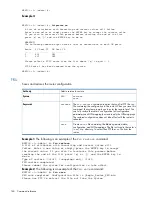
The
save logs
command creates a
tar
file that contains the
router’s log data, storing the file in the router’s
/var/ftp
logs
directory. When the command has finished executing, you must
FTP the log’s
tar
file from the blade.
The
save traces
command creates a
tar
file that contains the
router’s dump data, storing the file in the router’s
/var/ftp
traces
directory. When the command has finished executing, you must
FTP the trace’s
tar
file from the blade. The system notifies you if
the router does not have any dump data. Each time it generates
dump data, the system adds an event log entry.
Example 1:
MPX200 <1>(admin) #> save capture
Debug capture completed. Package is System_Capture.tar.gz
Please use FTP to extract the file out from the System.
Example 2:
MPX200 <1>(admin) #> save logs
Save Event Logs completed. Package is Router_Evl.tar.gz
Please use FTP to extract the file out from the System.
Example 3:
MPX200 <1>(admin) #> save traces
Save ASIC Traces completed. Package is Router_Asic_Trace.tar.gz
Please use FTP to extract the file out from the System.
Set
Configures general router parameters, as well as parameters for the FC, iSCSI, and management
ports.
Admin session
Authority
alias
chap
set
Syntax
chassis
fc [<PORT_NUM>]
features
iscsi [<PORT_NUM>]
isns
mgmt
ntp
properties
snmp [trap_destinations [<DEST_NUM>]]
system
vpgroups [vpgroup index]
Assigns an alias name to a presented iSCSI target. See
“set alias command” (page 169)
.
alias
Keywords
Sets the CHAP secrets. See
“set CHAP
command” (page 169)
.
chap
Sets the chassis name. See
“set chassis
command” (page 170)
.
chassis
Sets the FC port parameters. See
“set FC
command” (page 170)
.
fc [<PORT_NUM>]
Applies license keys to the router. See
“set features
command” (page 172)
.
features
Sets the iSCSI port parameters. See
“set iSCSI
command” (page 172)
.
iscsi [<PORT_NUM>]
168 Command reference
















































